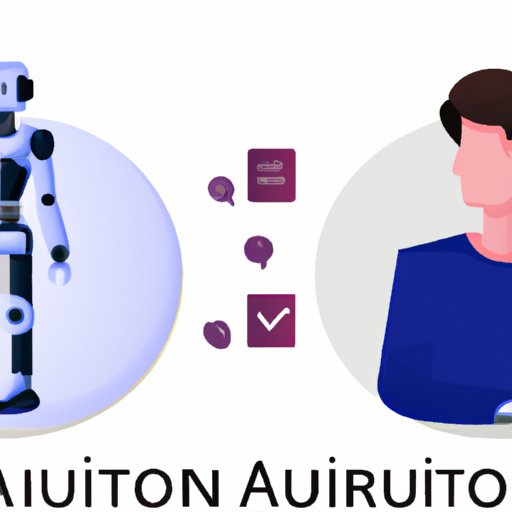Introduction
Artificial Intelligence (AI) is a branch of computer science that studies the development of intelligent machines that can think and work like humans. AI has been around for decades, but it’s only recently that its potential to create jobs has been explored. This article will examine the impact of AI on job creation and explore how automation will affect existing and new job types.
Examining Current AI Jobs and Their Role in the Economy
AI-driven jobs are on the rise, with businesses increasingly relying on these positions to automate tasks and improve efficiency. According to a recent report by PwC, “AI could add up to $15.7 trillion to the global economy in 2030 — more than the current output of China and India combined.”
Types of AI-driven jobs include software engineers, data scientists, machine learning engineers, and robotic process automation (RPA) developers. These roles require individuals with knowledge of programming languages, mathematics, and statistics, as well as an understanding of AI algorithms and their application. AI-driven jobs offer numerous benefits, including increased productivity, improved decision-making, and cost savings.
Analyzing Potential Industries That Could Benefit Most From AI Job Creation
AI has the potential to revolutionize a variety of industries, from healthcare to manufacturing. In healthcare, AI can be used to analyze medical images and diagnose diseases, while in manufacturing, robots and automated systems can be used to streamline processes and increase efficiency. AI can also be used in education to personalize instruction and help students learn more effectively.
AI is also transforming the financial services industry, with AI-driven jobs such as data analysts and risk managers becoming increasingly important. AI can be used to analyze customer data, detect fraud, and manage investments more accurately.
Comparing Human and Machine Employment Opportunities
Humans and machines have different strengths and weaknesses when it comes to employment opportunities. Humans are better at creative problem solving and complex tasks, while machines are better at repetitive tasks and analyzing large amounts of data. Increasingly, businesses are turning to AI to automate mundane tasks, freeing up time for employees to focus on more meaningful work.
In addition, AI-driven jobs offer higher salaries than traditional jobs. According to a study by the World Economic Forum, “the average salary for an AI specialist is nearly double that of other tech professionals.” This means that AI-driven jobs can provide a lucrative career path for those with the necessary skills and experience.

Understanding How AI Will Transform Existing Jobs
AI is already transforming existing jobs, automating mundane tasks and improving efficiency. For example, AI can be used to automate customer service tasks, such as responding to customer queries, or to analyze data and identify patterns in customer behavior. AI can also be used to automate tedious tasks such as bookkeeping, freeing up employees to focus on more strategic work.
AI is also being used in more complex roles, such as legal research and analysis. AI-driven tools can be used to quickly identify relevant cases and laws, helping lawyers save valuable time and resources.

Investigating How AI Could Create New Job Types
AI has the potential to create entirely new job types, such as predictive analysts and data miners. Predictive analysts use AI-driven tools to analyze data and identify patterns, enabling businesses to make informed decisions. Data miners use AI-driven tools to collect and analyze data, providing insights into customer behavior and trends.
AI could also create new roles such as AI trainers, who are responsible for training AI algorithms and ensuring they are performing correctly. AI trainers need to have an in-depth understanding of AI algorithms, as well as expertise in coding and data analysis.

Evaluating How Automation Will Affect Employment Prospects
Automation is likely to have both positive and negative effects on employment prospects. On the one hand, automation could lead to job losses as machines take over certain roles. On the other hand, automation could create new job types, such as those mentioned above, and increase demand for skilled workers.
A study by McKinsey Global Institute found that “while about half of all activities people are paid to do globally could potentially be automated using currently demonstrated technologies, less than 5 percent of all occupations can be entirely automated.” This means that while some jobs may be automated, there will still be a need for human workers.
Conclusion
AI has the potential to revolutionize the way we work and create entirely new job types. While automation could lead to job losses, it could also create new opportunities for skilled workers. Businesses should consider how AI could benefit their operations and use it to automate mundane tasks and improve efficiency.
(Note: Is this article not meeting your expectations? Do you have knowledge or insights to share? Unlock new opportunities and expand your reach by joining our authors team. Click Registration to join us and share your expertise with our readers.)
